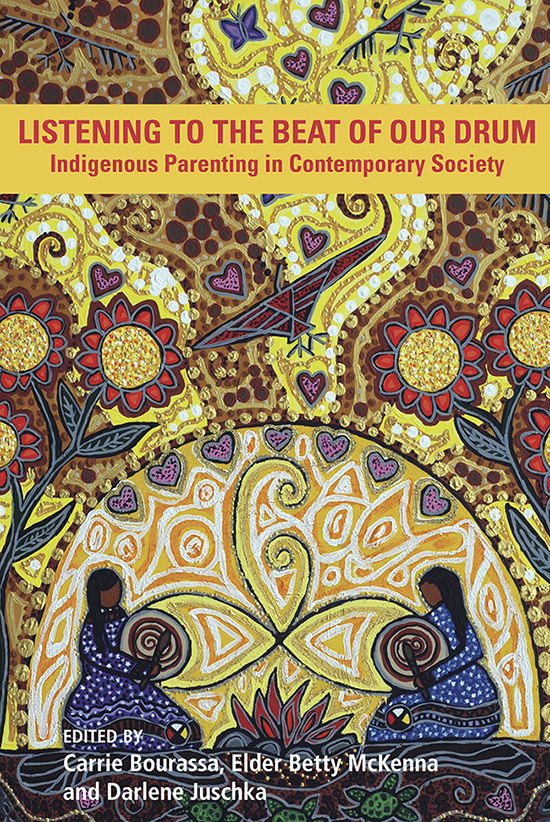
Out of stock
Price: $29.95
Page Count: 125
Publication Date: May 1, 2017
ISBN: 978-1-77258-106-5
Listening to the Beat of Our Drum: Indigenous Parenting in a Contemporary Society is a collection of stories, inspired by a wealth of experiences across space and time from a kokum, an auntie, two-spirit parents, a Metis mother, a Tlinglit/Anishnabe Métis mother and an allied feminist mother. This book is born out of the need to share experiences and story. Storytelling is one of the most powerful forms of passing on teachings and values that we have in our Indigenous communities. This book weaves personal stories to explore mothering practices and examines historical contexts and underpinnings that contribute to contemporary parenting practices. We share our stories with the hope that it will resonate with readers whether they are in the classroom or in the community. Like our contributors, we are from all walks of life, sharing diverse perspectives about mothering whether it be as a mother, auntie, kokum or other adopted role.
“The diversity of these stories of parenting is indicative of the diversity we see in the Indigenous communities of Turtle Island. The authors share their past colonial experiences yet bring hope by expressing how current cultural practices are imbedded in their parenting. Listening to the Beat of Our Own Drum is a testament to the decolonization of communities, families, and parenting.”
—LYNN LAVALLÉE, Associate Professor, School of Social Work, Ryerson University
“A fresh, fascinating and instructive book with a forward-looking approach in terms of the healing and regeneration of Indigenous parenting. These often personal stories come from a variety of experiences, lenses, and underrepresented voices, making an engaging read and attesting to the ongoing strength of extended Indigenous families.”
—KIM ANDERSON, Associate Professor, Department of Family Relations and Applied Nutrition, University of Guelph
Acknowledgments
Foreword
Blair Stonechild
Introduction
Carrie Bourassa and Darlene Juschka
Research and Indigenous Research
Elder Betty McKenna
Indigenous Women, Reproductive Justice, and Indigenous Feminisms: A Narrative
Darlene Juschka
Reclaiming Indigenous Practices in a Modern World
Carrie Bourassa
Carrie Bourassa is a the new Chair of Northern & Indigenous Health at Health Sciences North Research Institute in Sudbury after spending the last fifteen years as Professor of Indigenous Health Studies at First Nations University of Canada. Carrie completed her Ph.D. (Social Studies) in 2008. Her dissertation is entitled Destruction of the Métis Nation: Health Consequences. Her book, based on her dissertation was released in the fall of 2012 entitled Métis Health: The Invisible Problem. Dr. Bourassa is proud to be the successful Nominated Principal Investigator on two Canada Foundation for Innovation Grants that funded the Indigenous Community-based Health Research Labs at FNUniv and the Cultural Safety, Evaluation and Training Lab. Carrie is a member of the Royal Society of Canada, College of New Scholars, Artists and Scientists, an Institute Advisory Board Member, Institute of Indigenous People’s Health and a Public Member of the Royal College of Physicians and Surgeons of Canada. Carrie’s research interests include the impacts of colonization on the health of Indigenous people; creating culturally safe care in health service delivery; Indigenous community based health research methodology; Indigenous HIV/AIDS research; Indigenous end of life and dementia care and Indigenous women’s health. Carrie is Métis, belonging to the Regina Riel Métis Council #34. She resides in Regina with her husband, Chad and her daughters, Victoria and Lillie
Elder Betty McKenna is Anishnabae from the Shoal River Band and is very knowledgeable about many traditional teachings which she has learned from her grandmother and from teachings of various other elders. She is the Elder in Residence, First Nations and Métis Education at the Regina Public School Board as well as the guiding elder for RESOLVE (Research and Education to End Violence and Abuse) Saskatchewan, provides leadership to many research projects including: Completing the Circle: End of Life Care with Aboriginal Families with Dr. Mary Hampton and Dr. Carrie Bourassa, Understanding from Within: Developing Community-Driven and Culturally Safe Models for Understanding and Responding to Neurological Conditions among Aboriginal Women with the Native Women’s Association of Canada, Rural and Northern Response to Intimate Partner Violence with Dr. Mary Hampton and Aboriginal Grandmothers Caring for Grandchildren with Kerrie Strathy, Dr. Carrie Bourassa and Dr. Wendee Kubik, to name a few. She is also co-author on several peer reviewed publications and sits on two graduate committees at the University of Regina. Elder Betty was appointed by former Premier Roy Romanow to the College of Physicians and Surgeons Council of Saskatchewan. She serves on the National Elders Advisory, Correctional Services Canada as well as numerous other committees. In 2012, Elder Betty won a Saskatchewan Health Excellence Award in the “Health of a Population” category.
Darlene Juschka teaches in Women’s and Gender Studies and Religious Studies at the University of Regina. Her areas of interest are semiotics, critical theory, feminisms, and posthumanism. Some of her more recent work includes: “Feminism and Gender”. In Steven Engler and Michael Stausberg (eds.), The (Oxford) handbook of the study of religion; with Melissa Wuerch, Kim Zorn, and Mary Hampton (2016). “Responding to Intimate Partner Violence: Challenges Faced among Service Providers in Northern Communities” Journal of Interpersonal Violence, (May), 1-21; and “Enfleshing semiotics: The indexical and symbolic sign-functions”. (2014). She has also published Political Bodies, Body Politic: The Semiotics of Gender (2009) (Translated and published in Chinese in 2015) and Feminism in the study of religion: A reader (2001). She is currently working on a book entitled “Contours of the flesh: The semiotics of pain” and a case study focused on Intimate Partner violence in a northern Saskatchewan community.


